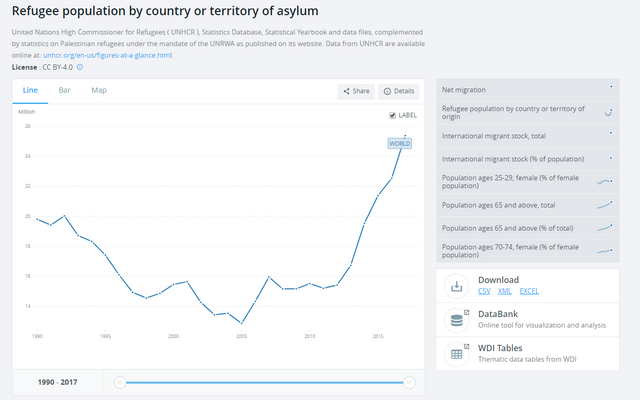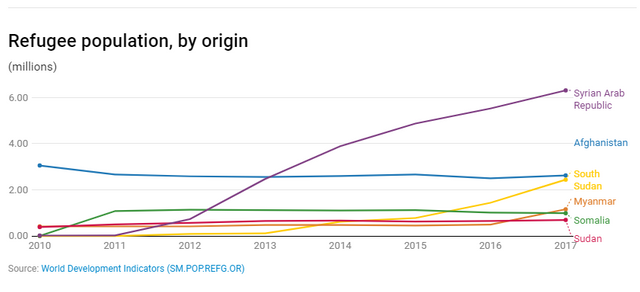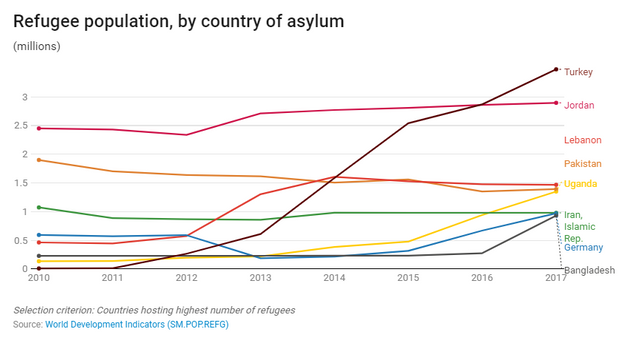2018 in Review - Migrants and Refugees
We can't think about 2018 without thinking about the extraordinary numbers of people forced to leave their homes because of war, famine, dire economic conditions, and yes, in some cases, desire for a better life for themselves and especially their children. This is the fourth in a series of extracts I've shared with you (see the list at the end of this post) of the World Bank's Year in Review: 2018 in 14 Charts report.
We've heard so much about the migrant caravan from Central America across Mexico into the US, about the Rohingya Muslims being chased off their homeland by a hostile Myanmar government, about Syrians trying desperately to make new lives for themselves in Europe (and Canada) now that their cities, towns and villages have been reduced to rubble in a miserable war, about Yemenis fighting famine as Saudi Arabia and Iran fight a proxy war over their heads, about West Africans trying anything they can to get to Europe, even getting themselves sold into slavery in Libya or dying as their rickety boats sink in the Mediterranean...shall I go on?

Let's put some numbers to this
According to the report, which bases its analysis on this subject on data publicly available in this database, some 68.5 million were refugees in 2018. To put that in context, have a look at the global refugee situation in 2017. If you go to the link you can mouse over the data points and get exact numbers - I'll save you the trouble for 2017 and tell you that the number of refugees globally (mousing over that data point over the word "WORLD" at the far right side of the graph) was 25,376,316.

And in 2018 it's 68.5 million?!?
43 million more people last year than the year before. Who are they, you ask? Where do they come from, and where are they going?
Here are some fact-checked answers for you from the Year in Review report, and they may be a bit surprising.
About 40 million people still live in their own countries, and 25.4 million are refugees abroad. Contrary to widely-held perceptions, 85 percent of the world’s refugees were hosted by developing countries in 2017. About 55 high-income countries hosted the rest, with 970,000 in Germany.
Many hosting countries have found their resources strained, including Lebanon, which hosts the largest number of refugees per capita in the world, with about 1 out of every 4 of the population a Syrian refugee. Around 70 percent live below the poverty line. Uganda currently hosts more than 1 million South Sudanese refugees. Some 655,500 refugees fled Myanmar to Bangladesh in the space of 100 days in 2017, and today more than 1 million live in Cox’s Bazar in the largest refugee camp in the world. Roughly 3 million people have left Venezuela in recent years amid the deepening economic crisis there, but most are not officially designated as refugees. More than a million people leaving Venezuela have settled in Colombia, according to the International Organization for Migration.
Where did they call home?
Here's what it looks like graphically in terms of the "Top 6" countries where people were forced to leave their homes since 2010:

Look what the war in Syria has done to those people over the last eight years, not to mention the government activities in Myanmar which Aung San Suu Kyi refuses to admit amount to ethnic cleansing, if not genocide.
And where are they finding asylum?
Again, the Year in Review report provides a chart which breaks this down into a "Top 8".

And I'll bet a few of you were surprised about where most of those refugees are going. Although numbers for South Africa hosting refugees don't feature in these "Tops", I've heard enough friends and colleagues say that "those refugees should just go home now - they're taking our jobs and our women and we've had enough." Spare a thought for Uganda, now home to 1.35 million refugees, with its own limited resources. And spare some thoughtful, targeted protest for how Australia treats refugees trying to reach its shores - it imprisons them in Papua New Guinea (last time I checked, not an Australian state or protectorate) for years.
Migrants and refugees - different words for "people"
These numbers don't put a human face on the refugee story. For me, the human face is represented by the stories my childhood friend now living in Ottawa, Canada, shares about the Syrian refugee family they have welcomed into their community. I would give more detail but prefer to protect their privacy. For more public stories, the BBC and Al Jazeera have done tremendous work documenting personal refugee stories over the last few years, and these are well worth looking up.
Refugees aren't numbers. They're people, like you and me, who just want to live a safe, peaceful and healthy life.
Other posts in what now seems to be a series
https://steemit.com/economy/@kiligirl/do-you-want-the-good-news-or-the-bad-news-first
https://steemit.com/womensrights/@kiligirl/women-s-lot-in-the-world-is-improving-slowly
https://steemit.com/waste/@kiligirl/waste-post-hasty
References
World Bank - Year in Review: 2018 in 14 Charts
World Bank - Refugee population by country or territory of asylum

Team South Africa banner designed by @bearone
I have concluded this is a game system with hands behind the scene shaping the policies, not to long ago Barbados announce Haitians would no longer require visa to travel there, it followed up with many people travelling there to get better opportunities, however, when they analyze the data closer, they realize someone were behind the scenes feeding these people lies and even conning them out of their money... I really can't say what is the end game but their agenda is to stop the flow of people and if nations go contrary to that, then they manufacture events to stir public opinions to will their agenda
Its a well played system
That's really sad, @daudimitch. When someone is a "stranger in a strange land", it's hard for them to know who to trust - but natural for them to trust those seeming to offer kindness.
That's the reason I say lots of what we see on the news media is a well orchestrated play, why do you think these events always seem to align with major events....
Its a best play when you think about it, you shape public opinion and shape policies, I think what is clear, those shaping those events are OK with the flow of money but not with the flow of people....
Funny enough with the dynamics of population growth in some countries, some of them actually need the migrants in the long-term to fill the gap in the tax revenues and maintain some basic services especially in health and infrastructure..
It's worth having an in-depth look at the report which I referenced in yesterday's post. It gives good insights into the various factors which drive people to leave their homes.